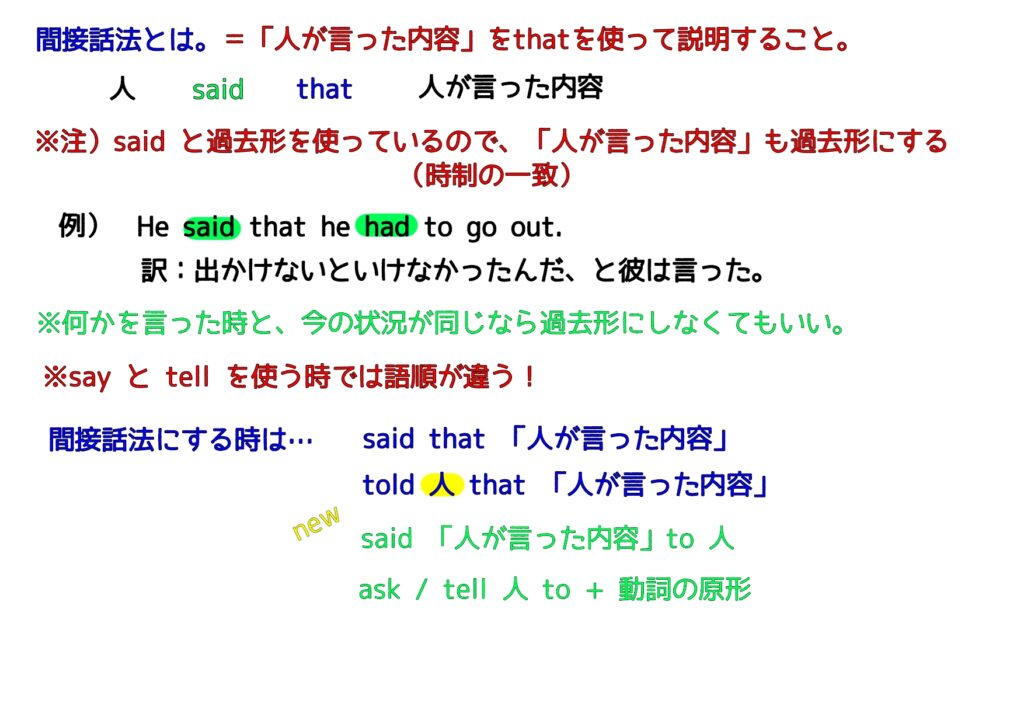第37回:間接話法での助動詞の使い方

助動詞を使った時の時制の一致は、どうなるのでしょうか?
Q. この記事で、一番大事なことって何?
A. 大事なことを、1枚の画像にまとめました。

いちいちノートにまとめるのが面倒だという方、また、
ノートにまとめることが苦手だという方は、ご活用ください。

[広告]
確かな英語力は、日々の継続から。
その継続を後押しする、第二言語習得理論に基づいた
オンライン英語学習プログラムがあります。
英語を使う人のための、確実なスキルアップが望める
7日間の無料体験はこちらから!

間接話法を使う時の助動詞の扱い方
今回は、間接話法における助動詞の扱いについて解説します。
まず、元の文に助動詞が含まれる場合、間接話法ではその助動詞が変化することがあります。
could、would、should、might、needn’t、ought to、used to、could have、should have
could、would、should、might、needn’t、ought to、used to、could have、should haveなどは、間接話法でもそのまま使われます。
“I could meet you at the airport.” → “He said that he could meet us at the airport.”
“We might drop in if we have time.” → “They said they might drop in if they have time.”
“You should have contacted me earlier.” → “She said I should have contacted her earlier.”
will、can、may
will、can、mayは、間接話法では以下のように変化します。
- 現在形の動詞がthat節にある場合、will、can、mayを使用する。
- 過去形の動詞がthat節にある場合、would、could、might、または、will、can、mayを使用する。
“She may have already left.” → “He thought she might have already left.”
また、報告文の節の動詞が現在形の場合、状況が現在または未来に存在する場合は、will、can、mayを使用します。過去形の場合は、would、could、または、will、can、mayを使用することができます。
shall
shallは、間接話法ではshould, wouldに置き換えます。
“I shall (I’ll) call you on Monday.” → “She told me she would call me on Monday.”
“Where shall I put this box?” → “He asked where he should put the box.”
must、mustn’t
must、mustn’tは、それぞれ以下のように扱います。
- 必要性を表すmustは、報告文でもそのまま使われます。
- mustn’tは、報告文でもそのまま使われます。
“You must be home by 9 o’clock.” → “She said I must / had to be home by 9 o’clock.”(話し言葉ではhad toの方が自然です)
“I didn’t hear the phone. I must be going deaf.” → “Alex thought he must be going deaf.”
“You mustn’t tell my brother.” → “He warned me that I mustn’t tell his brother.”
そして、元の文に助動詞が含まれない場合でも、that 以下で助動詞を使用することがあります。
“You’re not allowed to smoke here.” → “She told me that I mustn’t smoke there.”
“My advice is to look for a new job now!” → “She said that I should look for a new job now.”
具体例
具体例:
- 直接話法: “I could help you with your homework.” (宿題を手伝ってあげることができます。)
間接話法: He said that he could help me with my homework. (彼は、私が宿題を手伝ってあげることができると言った。) - 直接話法: “We might go to the movies tonight.” (今夜は映画に行くかもしれません。)
間接話法: They said they might go to the movies tonight if they have time. (彼らは、今夜時間があれば映画に行くかもしれないと言った。) - 直接話法: “I think she may have forgotten her keys.” (彼女は鍵を忘れたかもしれないと思う。)
間接話法: He thought she might have forgotten her keys. (彼は、彼女が鍵を忘れたかもしれないと思った。) - 直接話法: “I’ll give you a call tomorrow.” (明日電話するよ。)
間接話法: She told me she would give me a call tomorrow. (彼女は、明日電話すると言った。) - 直接話法: “You have to finish the report by Friday.” (金曜日までにレポートを仕上げなければならない。)
間接話法: She said I had to finish the report by Friday. (彼女は、私が金曜日までにレポートを仕上げなければならないと言った。) - 直接話法: “My advice is that you should take a break.” (私のアドバイスは、休憩を取ることです。)
間接話法: She said that I should take a break. (彼女は、私が休憩を取るべきだと言った。)
[広告]
TOEICのスコアを上げたいけれど、
まとまった勉強時間が取れなくて困っている…
なら、細かいスキマの時間を使いながら、
少しずつスキルを積み重ねてみてはどうでしょう。
スマホ1つでスコアアップが出来る、
オンライン講座のリンクはこちらから。

Q. この文法はどうやって使うのでしょうか?
A. 今回の文法を活用した会話文を見てみましょう。

Can you help me move this couch?
(このソファを動かすの手伝ってもらっていい?)

I could help you move the couch.
(手伝えると思うよ。)

Thanks! When are you available?
(ありがとう!いつなら時間がある?)

I’m free this Saturday. I can come over in the morning.
(今週の土曜日なら時間あるよ。朝に行けるよ。)

That works for me.
(それでいいよ。)

(Later, tell their friend)
I told them I could help them move the couch on Saturday morning.
(土曜日の朝、ソファを動かすのを手伝えるって言っちゃった。)

I see.
(そっか。)
[広告]
ロゼッタストーン・ラーニングセンターで、最先端の教育制度を活用して英語を学びませんか?私たちは個々の学習ペースに合わせてeラーニングと対面教育を組み合わせ、柔軟な学習環境を提供しています。自宅でのeラーニングと対面教育のメリットを最大限に活かし、あなたの英語学習をサポートします。最新のテクノロジーと個別の指導が組み合わさった当センターで、自由な学習スタイルを体験してみませんか?英語学習を楽しく効果的に進めるための環境がここにあります。新たな一歩を踏み出して、新しい英語学習の旅に参加しましょう!

Q. この記事の要点は?
A. 間接話法を使う時の助動詞についてまとめました。
助動詞をそのまま使うのか、変化させる必要があるのか。
時制を確認しながら、文を作ることが出来ると、
正確に、第三者に内容を伝えることが出来るようになります。
英会話を始めてみたいけれど、どのサービスが良いか分からない…
そんな方は、まず、この記事で3つのサービスを比べてみてはいかがでしょうか?
英語力を効率良く伸ばすことができるサービス3選です。

次回の文法解説は?
他にもある!報告の仕方。
この記事を作る際に参考にした文法の解説書になります。
すべて英語で書かれていますが、練習問題が付いてます。
イギリス英語なので、スペル等の表記が異なる部分もありますが、
「使い方を練習したい」「繰り返し問題を解きたい」
という方は、使ってみても良いかもしれません。

関連記事一覧
他の文法解説記事を検索できます。







-320x180.jpg)




コメント